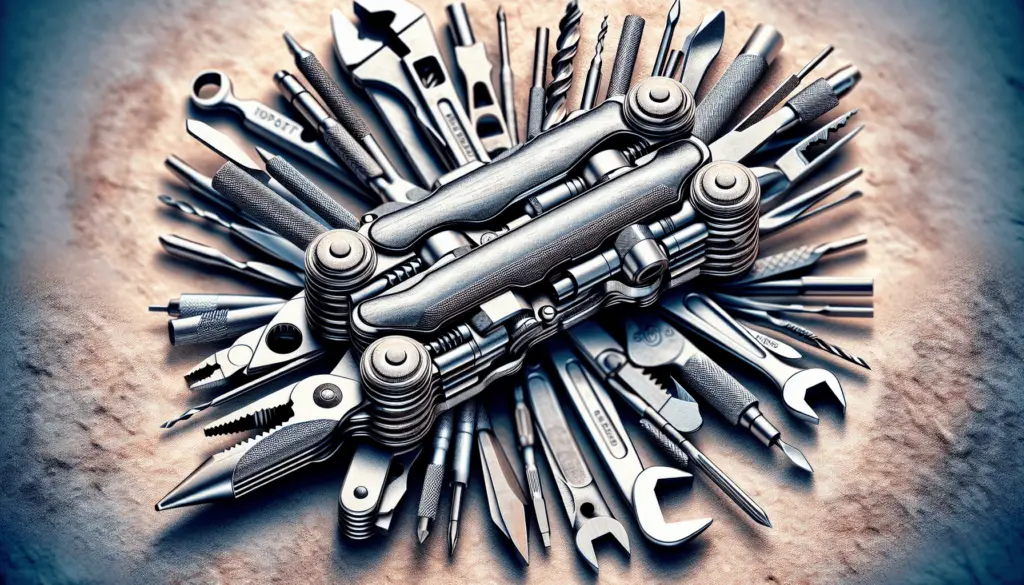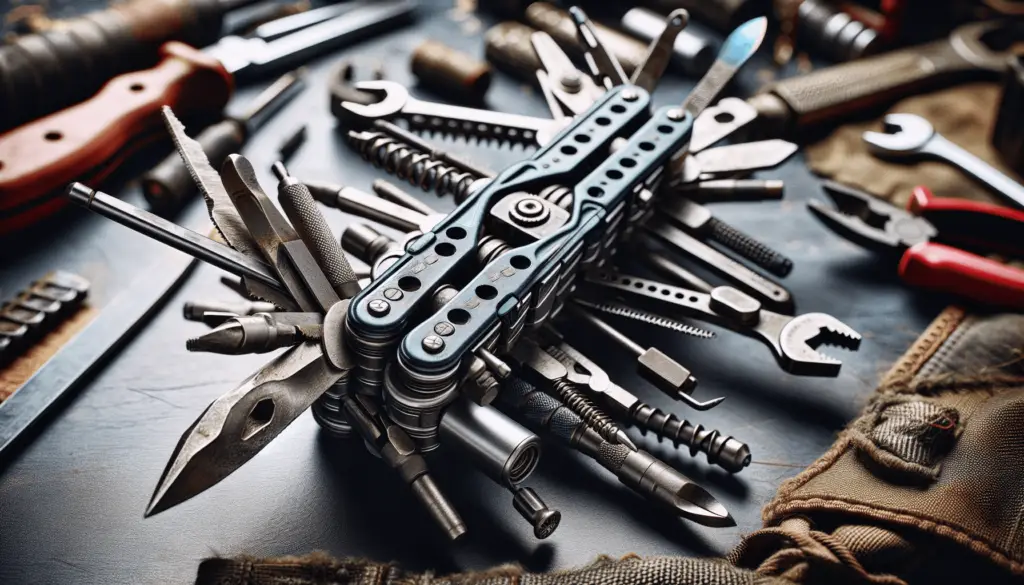Welcome to a guide on essential DIY skills for repairing and maintaining your prepping gear! As a savvy prepper, it’s important to know how to fix and maintain your equipment in case of emergencies. From patching up torn tents to troubleshooting malfunctioning gear, these practical skills will help you stay prepared and self-sufficient in any situation. So grab your tools and let’s dive into learning these valuable DIY skills! Have you ever found yourself in a situation where your prepping gear malfunctions, and you have no idea how to fix it? Whether you’re a seasoned prepper or just starting out, having the necessary DIY skills to repair and maintain your gear is essential. In this article, we will discuss the essential skills you need to ensure your prepping gear is in top shape when you need it most.

Assessing Your Gear
Before diving into the world of repairing and maintaining prepping gear, it’s crucial to assess what you have in your arsenal. Take inventory of all your gear, from your bug-out bag to your emergency food and water supplies. Make note of any items that are damaged, missing parts, or in need of maintenance.
Assessing your gear allows you to prioritize what needs immediate attention and what can wait. This step will also help you identify any tools or materials you may need to repair and maintain your gear effectively.
Basic Sewing Skills
One of the most common issues preppers face with their gear is ripped seams or torn fabric. Having basic sewing skills can come in handy when repairing clothing, backpacks, tents, or any other fabric-based gear. Learning how to stitch a simple seam or patch up a hole can prolong the lifespan of your gear and save you money in the long run.
Don’t worry if you’ve never picked up a needle and thread before. There are plenty of online tutorials and videos that can guide you through the basics of sewing. Invest in a quality sewing kit with different types of needles, thread, and fabric patches to tackle any sewing repairs effectively.
Gear Maintenance Techniques
Prevention is key when it comes to maintaining your prepping gear. Regularly cleaning, lubricating, and inspecting your gear can prevent minor issues from turning into major problems. Here are some maintenance techniques you can use to keep your gear in top condition:
-
Cleaning: Depending on the type of gear, cleaning methods may vary. Use a mild soap and water solution to clean fabric-based gear, while a silicone lubricant can be used to clean and protect metal components.
-
Lubrication: Keeping moving parts well-lubricated is essential for ensuring your gear functions properly. Apply a small amount of lubricant to zippers, buckles, and any other moving parts to prevent rust and corrosion.
-
Inspection: Regularly inspecting your gear for wear and tear, loose threads, or missing components can help you identify issues before they escalate. Make it a habit to inspect your gear after each use and before storing it away.
Basic Tool Knowledge
Having the right tools for the job is essential when it comes to repairing and maintaining your prepping gear. While you don’t need a fully stocked toolbox, having a few key tools can make DIY repairs much easier. Here are some basic tools every prepper should have in their arsenal:
-
Multi-tool: A multi-tool is a versatile tool that combines multiple functions into one compact device. Look for a multi-tool that includes pliers, screwdrivers, a knife, and other essential tools for quick repairs on the go.
-
Sewing Kit: As mentioned earlier, a sewing kit is essential for repairing fabric-based gear. Invest in a quality sewing kit that includes needles, thread, scissors, and fabric patches to handle any sewing repairs.
-
Duct Tape: Duct tape is a prepper’s best friend when it comes to quick fixes. Whether you need to patch up a hole in your tent or secure a broken strap, duct tape can temporarily hold things together until you can make a more permanent repair.

Knife Sharpening
A sharp knife is a crucial tool in any prepper’s arsenal. Whether you use it for cutting rope, preparing food, or self-defense, a sharp knife is more effective and safer to use than a dull one. Learning how to sharpen a knife properly can not only extend the life of your blade but also ensure it performs when you need it most.
Invest in a quality knife sharpener and learn how to use it correctly. There are various knife sharpening techniques, such as using a sharpening stone or a honing rod, so find the method that works best for your knives. Regularly sharpening your knives will make cutting tasks easier and safer in the long run.
Rope Knot Tying
Knowing how to tie various knots is a fundamental skill that every prepper should possess. Whether you’re securing a tarp, building a shelter, or setting up a rappelling system, understanding different knot-tying techniques can make a significant difference in your prepping endeavors.
Practice tying essential knots, such as the bowline, figure-eight, clove hitch, and square knot. These knots are versatile and can be used in a variety of situations. There are plenty of resources available online that can teach you how to tie different knots, so spend some time mastering this essential skill.
Electrical Repair Skills
In today’s world, many prepping gadgets and gear rely on electricity to function. Understanding basic electrical repair skills can come in handy when repairing or modifying electronic devices in your prepping kit. Whether it’s repairing a broken wire, soldering components, or troubleshooting electrical issues, having some knowledge in this area can save you time and money.
Invest in a basic electrical repair kit that includes wire cutters, wire strippers, a soldering iron, solder, and electrical tape. Familiarize yourself with how electronic circuits work and practice on simple projects to build your confidence and skills in electrical repairs.
Water Purification Techniques
Access to clean water is essential in any emergency or survival situation. Knowing how to purify water from questionable sources can prevent waterborne illnesses and keep you hydrated when clean water is scarce. There are various water purification techniques you can use in the field, such as boiling, chemical treatment, or filtration.
Invest in a quality water filtration system or portable water purifier for your prepping gear. Practice using these devices before an emergency occurs to ensure you know how to operate them correctly. Additionally, learn how to build a makeshift water filtration system using natural materials in case you run out of purification tablets or filters.
Fire Starting Methods
Fire is not only essential for keeping warm but also for cooking food, boiling water, and signaling for help in an emergency. Knowing how to start a fire using various methods can mean the difference between survival and disaster in a critical situation. Familiarize yourself with different fire starting techniques, such as using a lighter, matches, fire starter rods, or natural methods.
Always carry multiple fire starting tools in your prepping kit, such as waterproof matches, a flint and steel striker, and a butane lighter. Practice building fires in different conditions, such as windy or wet weather, to hone your fire starting skills. Remember to always follow fire safety protocols and laws when starting fires outdoors.
Conclusion
In conclusion, having essential DIY skills for repairing and maintaining your prepping gear is crucial for ensuring you’re prepared for any situation. By assessing your gear, learning basic sewing skills, maintaining your equipment, and acquiring knowledge in various areas such as knife sharpening, knot tying, electrical repairs, and water purification, you can enhance your prepping capabilities and be ready for whatever comes your way.
Remember to practice these skills regularly and stay up to date with the latest techniques and tools available. Your preparedness and survival instincts will be greatly enhanced by having the necessary DIY skills to keep your gear in top shape. Stay safe, stay prepared, and never stop learning new skills to improve your prepping endeavors.
